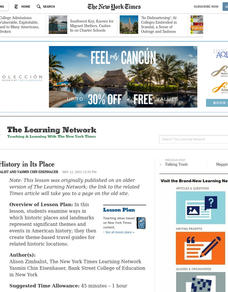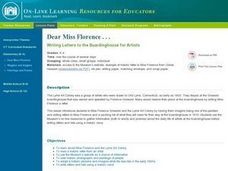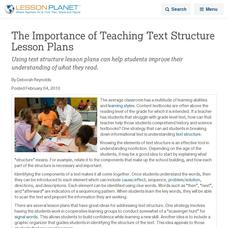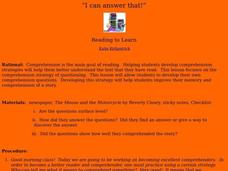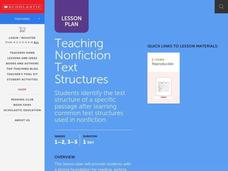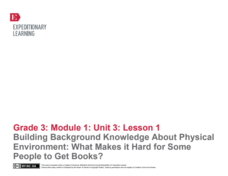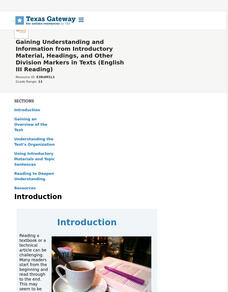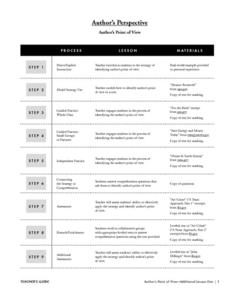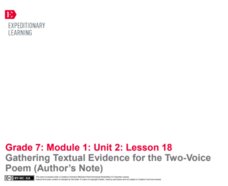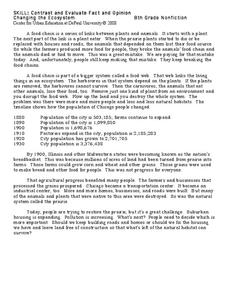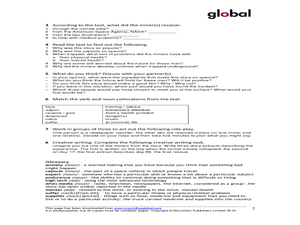Curated OER
Putting History in its Place
Examine ways in which historic places and landmarks represent significant themes and events in American history. Then create theme-based travel guides for related historic locations. This lesson requires informational reference materials...
Curated OER
Dear Miss Florence: Writing Letters To the Boardinghouse for Artists
Imagine being one of the painters in 1910 at the Lyme Art Colony in Connecticut. Using the Florence Griswold Museum's on-line resources to gather information about the daily life of artists at the boardinghouse, learners write a letter...
Curated OER
Butterflies, Butterflies, Butterflies
Transform your class into a butterfly museum! Research different types of butterflies, their habitat, and life cycle. Interactive components such as PowerPoint presentations, Claymation movies, and webpages add pizzaz to the museum...
Curated OER
The Importance of Teaching Text Structure Lesson Plans
Using text structure lesson plans can help students improve their understanding of what they read.
Curated OER
Build Mastery: Purpose for Reading
Do you agree? Set up three stations in your room for this reading comprehension activity: I agree, I disagree, and I'm not sure. Learners listen to statements and walk to the sign that best describes their response. Model this with an...
Curated OER
I Can Answer That!
Enhance reader comprehension! Examine different comprehension strategies with your second, third, and fourth graders. They discuss the strategy of questioning by developing their own comprehension questions to help improve their memory...
Curated OER
Journey to Jo'burg: Before and After Reading Activities
Delve into life in Johannesburg using this worksheet. This resource is made to go with Journey to Jo'Burg by Beverley Naidoo. Learners complete before and after reading activities for chapter 8 and then read a short informational text...
Curated OER
Teach Text Structure for Nonfiction
Students gain a strong foundation for reading, writing, and using nonfiction through this instructional activity. They gain an awareness and general understanding what text structures are. Students also identify and interpret what...
K12 Reader
Making Connections to Text
This short reading comprehension worksheet encourages readers to make self-to text, text-to-text, and text-to-world connections as a way of remembering what they have read.
Code.org
Encoding and Sending Formatted Text
Introduce your class to encoding text. Pairs work together to create a protocol to send text prior to learning ASCII encoding. Groups then collaborate to send and translate ASCII codes creating a formatted text message.
EngageNY
Organizing Evidence from Multiple Informational Texts to Prepare for Writing: What Makes an Earthquake a Natural Disaster?
Fifth graders prepare for their end of the unit essay assessment by continuing to look at what makes an earthquake a natural disaster. They complete a graphic organizer and write a topic sentence. To finish, they view a model essay and...
EngageNY
Building Background Knowledge About Physical Environment: What Makes it Hard for Some People to Get Books?
How far would your pupils go to be able to have access to books? Revisit Heather Henson and David Small's That Book Woman and challenge class members to take on the role of Cal or the Book Woman. By putting themselves in someone else's...
EngageNY
Determining Author’s Opinions, Reasons, and Evidence: Signs of Hope and Progress for African Americans in the 1920s (Promises to Keep, Pages 14–15)
Caption this. Readers look at the text features in Promises to Keep and pay special attention to the photographs and captions before adding to the Features of Informational Text anchor chart. Learners then answer questions about life in...
K12 Reader
Using Prior Knowledge
Sometimes it's hard to relate to a new text. Teach kids to use their prior knowledge when reading something new with a comprehension exercise. A short passage tells them how to think of their brains like filing systems, and provides five...
Texas Education Agency (TEA)
Gaining Understanding and Information from Introductory Material, Headings, and Other Division Markers in Texts (English III Reading)
All teachers are teachers of reading! The 13-part interactive series ends with a lesson that teaches learners (and their instructors) how to approach reading their textbooks. After learning about several strategies, users test their...
Take 10
Author’s Perspective
Gradually build understanding of author's point of view through a scaffolded set of exercises. Moving from direct instruction, to collaborative work, and eventually to independent practice, these steps will assist your class in grasping...
EngageNY
Gathering Textual Evidence for the Two-Voice Poem (Author’s Note)
Writers take a look at how to gather evidence from the information text in the unit that connects to Salva and Nya’s story. They complete a Gathering Evidence from Informational Texts sheet to guide their work. Pupils then use the...
Soft Schools
Civil Rights
Informational text about the Civil Rights Movement challenges young historians to prove their reading comprehension skills with six multiple choice questions. After answers are submitted a new screen displays a score, answers—correct and...
EngageNY
Annotating the Text and Identifying Argument, Claims, and Evidence: “Double Whammy” Excerpt from “The Exterminator"
That's a double whammy! Scholars read the excerpt Double Whammy from The Exterminator. After identifying the gist of the text, they annotate by marking the author's claim. The group discusses what is meant by double whammy and complete...
DePaul University
Contrast and Evaluate Fact and Opinion
How can you tell when an author is expression an opinion or stating a fact? Use two short reading selections to emphasize the difference between a statement that you can prove and one that you can't. The first passage explains food...
K20 LEARN
Bear Tale: Author's Purpose - Informing Or Entertaining
After reading The Mitten by Jan Brett, scholars discuss the author's purpose. Small groups compare and contrast a book written to entertain and a book to inform, then create a T-Chart detailing the characteristics of each. Learners...
Curated OER
Freedom for the Chilean Miners
Have your class read this seven paragraph article about Chilean miners who were trapped and freed from a mine. There are five comprehension questions, a verb-to-noun matching exercise, a role-play suggestion, and a creative writing task...
Curated OER
The Arab-Israeli Conflict
Provide your class with a context and series of events that has led to the conflict in the Middle East. They read 4 separate passages and answer 1 critical thinking question for each. Four more questions are posed at the bottom of the...
Curated OER
The Period of Discovery: The Boy Columbus
Learners increase their reading comprehension skills with a reading passage describing the early life of Christopher Columbus. They read the passage and then answer each of the five comprehension questions.
Other popular searches
- Informational Text Features
- Informational Text Passages
- Teaching Informational Text
- Informational Text Structure
- Writing Informational Text
- Informational Texts Unit
- Informational Text Lesson
- Comprehend Informational Text
- Summarizing Informational Text
- Using Informational Texts
- Analyzing Informational Text
- Informational Text8rating=3


